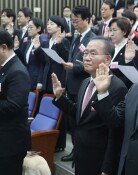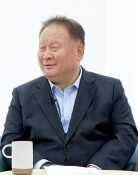S. Korea’s security should not be missed during negotiations
S. Korea’s security should not be missed during negotiations
Posted May. 29, 2018 07:41,
Updated May. 29, 2018 07:41
Sung Kim, U.S. Ambassador to the Philippines, and Choe Son Hui, North Korea’s vice foreign minister, started preparatory talks Sunday on the northern side of Panmunjom for the North Korea-U.S. summit scheduled for June 12. Meanwhile, separate working-level talks are underway between Joe Hagin, White House deputy chief of staff, and Kim Chang Son, director of the North’s State Affairs Commission, with regard to protocol and security. Now with the Kim-Trump meeting only two weeks away, the two sides are speeding up their preparatory works for the upcoming summit.
In Panmunjom, the war of nerves is being intensified over the key items of the agenda, denuclearization and measures to guarantee security. Above all, Washington demands that North Korea accomplish the complete, verifiable and irreversible denuclearization (CVID) to a great extent in a fast manner. Yet, what Pyongyang wants is “phased and concurrent measures” through which the regime, when implementing measures of denuclearization, is rewarded with the establishment of North Korea-U.S. relations, lifting of sanctions and signing of a peace treaty. “We are advancing along our path according to our own timetable no matter whatever others may say,” said North Korea’s Rodong Sinmun Monday.
In the end, both sides should be able to draw a plan for the swift implementation of denuclearization and security assurance measures, but the task is by no means simple. Though current working-level discussions are being led by the two countries’ top negotiators, there is always a chance that senior officials such as U.S. Secretary of State Mike Pompeo and the North Korean Workers' Party Central Committee Vice Chairman Kim Yong Chol will step in at the last minute. If the two sides continue to focus on expediting the negotiations, the devil in the details can come out with the security of South Korea overlooked during the process.
It is highly likely that North Korea and the United States will be focused, for the moment, on initial, visible measures, which is the starting point of a process towards denuclearization and peace. This is why Washington calls for the shipment of nuclear warheads, or at least part thereof, possessed by Pyongyang out of the country. In response to this demand, North Korea is likely to argue that the deployment of U.S. strategic assets should be halted and joint military exercises be scaled down, saying their ultimate goal is the denuclearization of the “Korean Peninsula,” not “North Korea.”
Under these circumstances, President Moon Jae-in repeatedly mentioned his intention to pursue the declaration of the end of the Korean War as a starting point. The presidential office Cheong Wa Dae appears to be expecting that the Kim-Trump meeting in Singapore will directly lead to such a declaration made between the two Koreas and the United States. Yet, if the end of the war is declared, it will be more than a symbolic declaration that is not legally binding, and follow-up measures may harm the country’s security interests. Thus, the South Korean government should not lower its guard down and must work in an airtight coordination with the United States.







